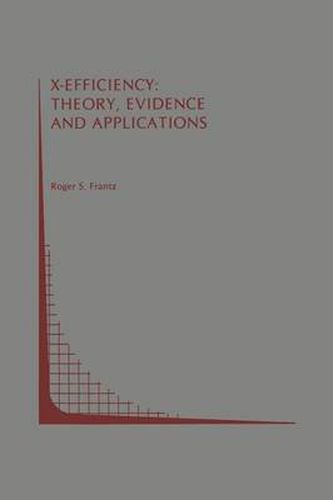Readings Newsletter
Become a Readings Member to make your shopping experience even easier.
Sign in or sign up for free!
You’re not far away from qualifying for FREE standard shipping within Australia
You’ve qualified for FREE standard shipping within Australia
The cart is loading…






This title is printed to order. This book may have been self-published. If so, we cannot guarantee the quality of the content. In the main most books will have gone through the editing process however some may not. We therefore suggest that you be aware of this before ordering this book. If in doubt check either the author or publisher’s details as we are unable to accept any returns unless they are faulty. Please contact us if you have any questions.
My interest in X-Efficiency (XE) dates back to 1978. At the time, I was writing the dissertation for my Ph. D. at Washington State University. My dissertation was concerned with the role of attitudes in the school-to-work transition among young men. I was advised by Professor Millard Hastay (a member of my committee) to look at Leibenstein’s new book, Beyond Economic Man. One of the things that caught my attention was his be havioral description of (selective) rationality. It seemed that Leibenstein’s behavioral description of a (selectively) rational individual was very similar to what psychologists such as Abraham Maslow were reporting as being the product of a particular motivational system. In other words, I was im pressed with the idea that what Leibenstein was referring to as X-ineffi ciency was being discussed by psychologists as the way it (often) is.
So from the beginning I always considered the concept of X-(in)efficiency to be a valuable one for understanding human behavior. I have since come to believe that this is particularly true when considering behavior in non market environments, i. e. , within the firm. Work on this book, however, can most realistically said to have started with work which I began in 1982 while I was a Visiting Scholar at Harvard University. Professor Leibenstein suggested that I consider how some em pirical evidence which was being cited as evidence for the role of property rights might also be consistent with XE theory.
$9.00 standard shipping within Australia
FREE standard shipping within Australia for orders over $100.00
Express & International shipping calculated at checkout
This title is printed to order. This book may have been self-published. If so, we cannot guarantee the quality of the content. In the main most books will have gone through the editing process however some may not. We therefore suggest that you be aware of this before ordering this book. If in doubt check either the author or publisher’s details as we are unable to accept any returns unless they are faulty. Please contact us if you have any questions.
My interest in X-Efficiency (XE) dates back to 1978. At the time, I was writing the dissertation for my Ph. D. at Washington State University. My dissertation was concerned with the role of attitudes in the school-to-work transition among young men. I was advised by Professor Millard Hastay (a member of my committee) to look at Leibenstein’s new book, Beyond Economic Man. One of the things that caught my attention was his be havioral description of (selective) rationality. It seemed that Leibenstein’s behavioral description of a (selectively) rational individual was very similar to what psychologists such as Abraham Maslow were reporting as being the product of a particular motivational system. In other words, I was im pressed with the idea that what Leibenstein was referring to as X-ineffi ciency was being discussed by psychologists as the way it (often) is.
So from the beginning I always considered the concept of X-(in)efficiency to be a valuable one for understanding human behavior. I have since come to believe that this is particularly true when considering behavior in non market environments, i. e. , within the firm. Work on this book, however, can most realistically said to have started with work which I began in 1982 while I was a Visiting Scholar at Harvard University. Professor Leibenstein suggested that I consider how some em pirical evidence which was being cited as evidence for the role of property rights might also be consistent with XE theory.